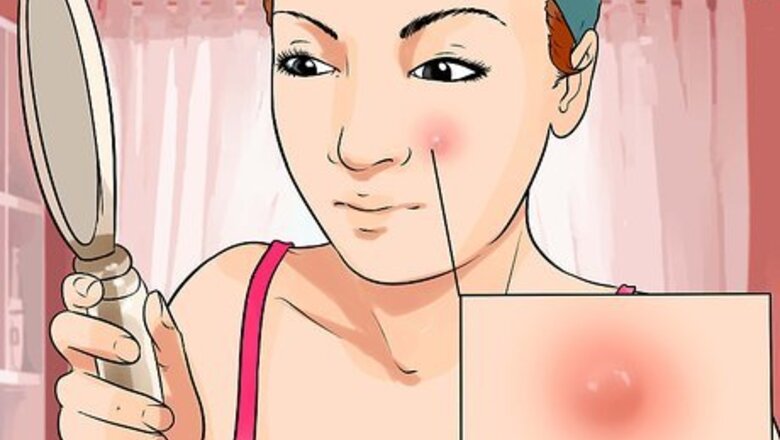
views
X
Trustworthy Source
Mayo Clinic
Educational website from one of the world's leading hospitals
Go to source
Boils are relatively common and typically caused by Staphylococcus aureus bacteria. Home care for boils should not normally involve popping or squeezing them because there's risk of spreading the infection, especially with those who have relatively weak immune systems (young kids, diabetics, the elderly). See your doctor about lancing a boil if your home remedies are ineffective.
Treating Boils at Home
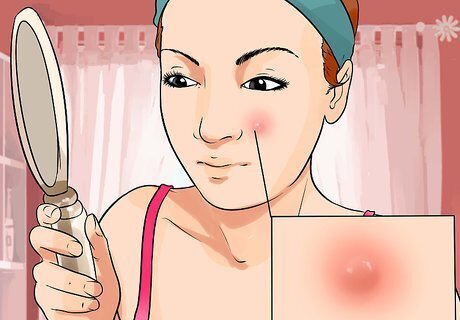
Wait and see. Most people's natural immune systems are strong enough to effectively deal with minor skin infections such as boils. Thus, boils often heal on their own after a period of a few weeks, although you'll likely experience some itching and mild throbbing pain in the early stages. Boils can become more painful with time as the pressure builds up from pus accumulation, although they can spontaneously burst after a few weeks and then clear up quickly. If you are anticipating a boil bursting on its own after a few weeks, be prepared by carrying some antibiotic wipes and clean tissues with you or in your car. If you have a boil on your face, keep it clean and refrain from covering it up with a thick layer of make-up or cover-up. Facial boils can be embarrassing, but it’s best to expose them to the air and let your immune system deal with them.
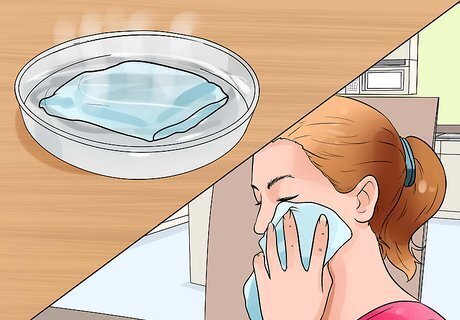
Apply a warm compress. Applying a warm washcloth or flannel compress to your boil helps to rupture and drain it because the heat expands the blood vessels underneath the skin and increases blood and lymph flow. The warmth may also help soothe the pain, even though it’s promoting local inflammation. Soak a clean washcloth in water and put it in the microwave for between 30-45 seconds. Apply the warm compress to the affected area several times daily (for about 20 minutes at a time) until the boil starts to naturally drain and shrink. Be sure to wash and rinse the towel once you are done to avoid spreading the infection, although microwaving it will likely kill any bacteria anyway. Make sure the cloth from the microwave doesn't scald your skin and make the problem worse.
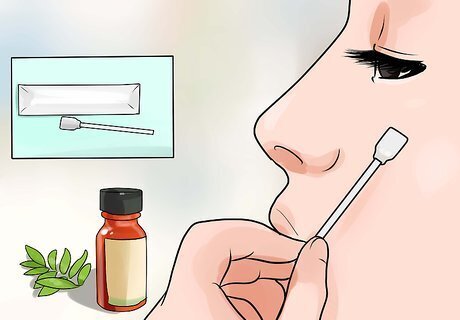
Consider using tea tree oil. Tea tree oil is a natural antibiotic/antiseptic commonly used to treat skin infections — it's extracted from the leaves of the Australian tea tree. Tea tree oil may help get rid of boils because it has anti-inflammatory and antibacterial properties, although the degree to which it can absorb deep into the skin is not well understood. It's also useful for preventing the spread of the bacteria once the boil has burst. Use a clean swab, dip it into the tea tree oil and then lightly dab your boil three to five times daily. Keep it away from your eyes as it might sting. Tea tree oil can trigger allergic reactions in some people (it's rare), so stop applying it if you notice the skin around the boil is getting irritated and puffy. Other natural antibiotics that have similar effects to tea tree oil include olive leaf extract, oregano oil, lavender, hydrogen peroxide, white vinegar, and iodine solution.
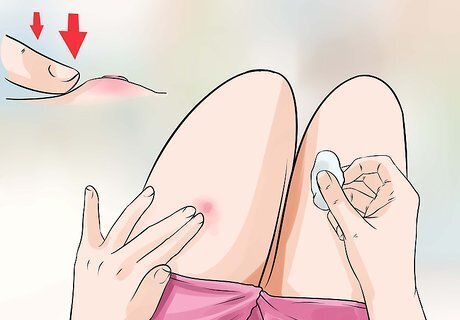
Promote boil drainage. Once the boil bursts on its own, promote drainage by lightly putting some pressure on the edges with clean absorbent tissues. Don't be surprised if you see quite a bit of pus and blood come out of a boil — it's typically much more compared to a large pimple. Soak as much of the blood and pus up as possible, dispose of the tissue, then thoroughly clean the area with antibiotic wipes. Boils aren't contagious, but the bacteria within them can be. The boil may continue to "weep" (slowly drain) for a few hours, so consider dabbing it with some antibiotic cream or lotion and then covering it with a small bandage overnight. As best as you can, make sure the boil stays clean, dry, and covered the few weeks after it has drained. Keep applying warm compresses for a few days after the boil has opened to help drain it as much as possible. Remember to always use clean compresses.
Seeking Medical Treatment
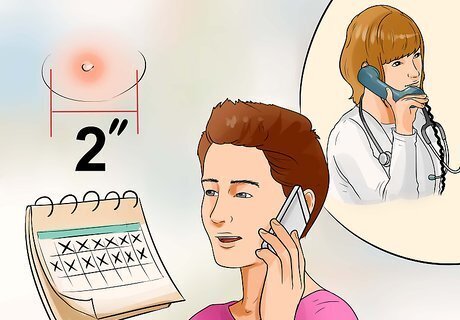
Know when to call your doctor. Most boils are caused by ingrown hairs or by splinters or debris getting lodged in the skin. In otherwise healthy people with strong immune systems, the boils get resolved and fade away within a few weeks. However, if your boil persists for more than a few weeks (or is chronically occurring) and involves severe pain, swollen lymph nodes, fevers/chills and/or loss of appetite, then call your family doctor and have it examined. Large boils (greater than 2 inches in diameter) should also be looked at by your doctor. Boils are not considered very serious, but other more serious conditions that can look similar include skin cancer, allergic reactions, wasp or bee stings, diabetic abscess, MRSA, herpes outbreak, and chickenpox. Applying antibiotic cream (Neosporin, Bacitracin, Polysporin) on boils often is ineffective because it doesn't penetrate deep enough into the skin to reach the bacteria.
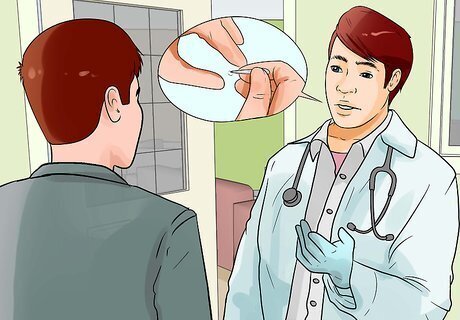
Ask your doctor about lancing. If your doctor confirms the skin lesion is a boil and not something more serious, then he/she might recommend lancing it if you've been dealing with it for more than a few weeks, or if it's particularly large or painful. Lancing is a minor in-office procedure in which the doctor applies a local anesthetic and then makes a small incision into the tip of the boil to release the pus and promote drainage. The doctor will then bandage it up and send you home with basic cleaning instructions. Lancing by your doctor is always a much safer alternative to popping the boil at home yourself. In some cases, large, deep skin infections that can't be completely drained by lancing may be packed with sterile gauze to help soak up additional pus. Depending on the size of the boil, lancing it may leave a small scar on your skin. This may be a concern if the boil is on your face, so weigh your options with your doctor carefully.
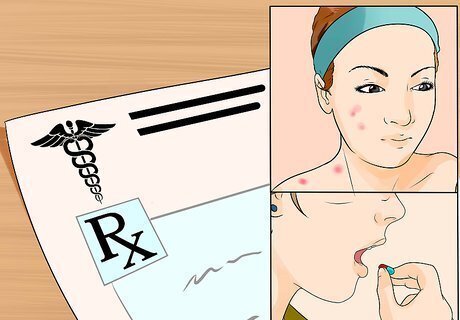
Take antibiotics only if strongly recommended. Antibiotic medications are seldom needed to deal with boils, although your doctor may prescribe them if the infection is severe enough or reoccurring. For people with multiple or recurrent boils, antibiotics are usually prescribed by mouth for 10 or 14 days. In particularly severe cases, two different antibiotics may be prescribed, plus the use of strong antibiotic ointments to be applied to the skin throughout the day. Overuse of antibiotics during the last few decades has created many resistant bacterial strains that can be life-threatening. If you develop a boil or other type of infection while in the hospital for a different ailment, then tell your caregivers immediately. Side effect of antibiotics include destruction of "friendly" bacteria in your intestines, which can lead to poor digestion, diarrhea, abdominal cramps and nausea. Allergic reactions, rashes, and breathing difficulty are also relatively common with antibiotic use.



















Comments
0 comment